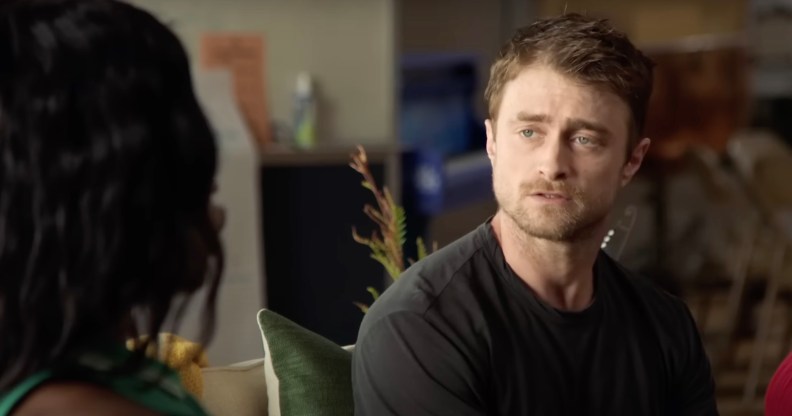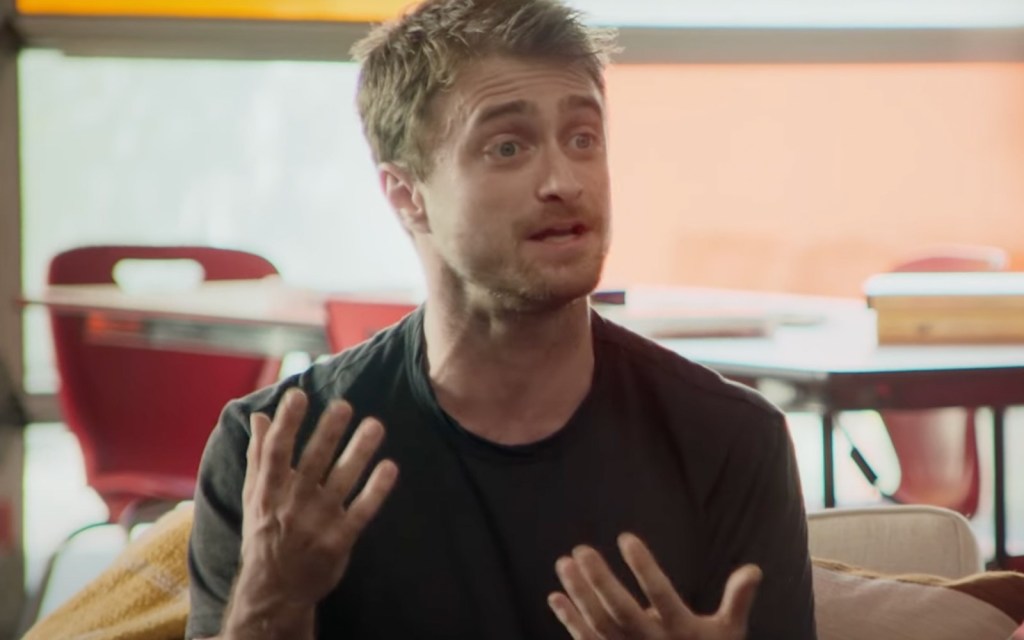Daniel Radcliffe has a ‘weird little problem’ with people calling themselves ‘ally’

Actor Daniel Radcliffe moderates a panel of young trans and non-binary people for The Trevor Project’s Sharing Space series. (YouTube/The Trevor Project)
Actor Daniel Radcliffe has conducted a meaningful panel on allyship, gender euphoria and boundaries with a group of trans and non-binary youth as part of a series for LGBTQ+ charity The Trevor Project.
The 20-minute episode saw the young trans and non-binary speakers share their own stories, and explain that they would like an emphasis on “kindness” when it comes to speaking about LGBTQ+ issues.
In a preview of the discussion, Radcliffe urged people to “listen to trans kids” when it came to discussing their rights and existence.
In the first episode of the Sharing Space series of talks, the Harry Potter actor explained that he has “little problems” with the word “ally”, with a panel member explaining that self-described LGBTQ+ “allies” should still be held accountable if they make mistakes.
The first episode dropped on Friday (31 March), Trans Day of Visibility, with further episodes to be released quarterly.
Radcliffe, 33, explained that he is “suspicious” of those who brag about their allyship, and encouraged the speakers to share their thoughts on how people can be stronger allies to the trans community.
“I said this to you all earlier, about my weird little problems with the word ‘ally’ – just because anytime you hear somebody self-refer to themselves as an ally, I’m always like, ‘I’m suspicious of you’,” he said.
“But there is an original meaning to that word, and there [are] some people who embody that very powerfully.”
Deity The Why, one of the six panellists, explained that trans people have to accept that “even with allies, we still have to communicate what makes us feel good and what are boundaries”.
“The first thing a person that calls themselves an ally thinks is that, ‘because I believe in you and because I see you the way you want to be seen, I can’t do anything else wrong’,” they added.
“You can’t be an ally to anyone … if you cannot sit down and acknowledge when you’ve done something that hurts someone or that can make someone feel less.”
Radcliffe added that he has always known that he was male, and that he “never had a moment” that he realised his gender, explaining that this means we can “trust kids to tell us who they are”.
The panel also spoke about the way trans and non-binary people are treated in other cultures, and that before colonialism, LGBTQ+ people had often been celebrated in several cultures.
Deity The Why explained: “In Africa, there were trans identities way before colonialism started. And there were men that would not only marry cis wives, but also trans wives and their polyamorous and poly relationships.
“It’s not atypical, it’s just the fact that when you colonised, you wrote your history books to fit the ideals you wanted us to know for years and years and years.”
Radcliffe added that while some people claim the use of pronouns are “new”, trans and non-binary identities are not “new” at all.

Ahead of the first episode of Sharing Space being released, Daniel Radcliffe explained in a statement that we need to listen to trans and non-binary youth directly.
“We listen to so many people talk about trans youth and hear them talked about so often in the news, but very rarely do we actually hear from these youth directly,” Radcliffe said.
“It was an absolute privilege to get to meet and listen to this incredible group of young people.
“At the end of the day, if you’re going to talk about trans kids, it might be useful to actually listen to trans kids.”
The Harry Potter star first spoke out in 2020 in a direct comment on JK Rowling’s views on trans rights, explaining that we need to support LGBTQ+ people rather than “invalidate their identities” and “cause further harm”.
“Transgender women are women. Any statement to the contrary erases the identity and dignity of transgender people and goes against all advice given by professional healthcare associations who have far more expertise on this subject matter than either Jo [Rowling] or [me],” he said at the time.
“To all the people who now feel that their experience of the books has been tarnished or diminished, I am deeply sorry for the pain these comments have caused you.
“I really hope that you don’t entirely lose what was valuable in these stories to you.”

